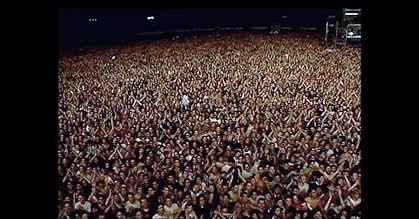IMDb RATING
7.6/10
1.4K
YOUR RATING
Soda Stereo, Café Tacvba, Aterciopelados and others feature in this 50-year history of Latin American rock through dictatorships, disasters and dissent.Soda Stereo, Café Tacvba, Aterciopelados and others feature in this 50-year history of Latin American rock through dictatorships, disasters and dissent.Soda Stereo, Café Tacvba, Aterciopelados and others feature in this 50-year history of Latin American rock through dictatorships, disasters and dissent.
Browse episodes
Featured reviews
Totally biased my review because I'm latina and rocker so... Well, to put in context all of our latinamerican history of rock it's amazing because you can understand the whole message of the music and it's more powerful than what you've imagined. I think the people who like the latin rock, you have you watch this piece of art. I think that all the actors appear or are mentioned. It's really complete.
Loved it. Very touching. It summarizes amanzingly how Rock en tu Idioma came to be. Really liked the format, following the timeline. Nowadays, many like to tell stories playing with flashbacks, going back and forth. I am glad this was not the case as I could remember it all as I lived it. I found it fast paced tho'... or maybe I was just enjoying too much.
I enjoyed the first part of the documentary, showing the early stages of rock, the political circumstances that model the artist. Then this documentary turns into cheap and gross propaganda of Gustavo Santaolalla bands.
In the part of the 90s to the actuality only talks about the commercial (complacent rock as Santaolalla says) and left behind the really popular bands like La Renga, Ataque 77, Callejeros (Only named for Cromagnon), Rata Blanca, and many others. The time dedicated to Los Redonditos and Pappo is insulting compared with other artists.
This is a documentary of commercial/complacent rock, not about popular rock.
In the part of the 90s to the actuality only talks about the commercial (complacent rock as Santaolalla says) and left behind the really popular bands like La Renga, Ataque 77, Callejeros (Only named for Cromagnon), Rata Blanca, and many others. The time dedicated to Los Redonditos and Pappo is insulting compared with other artists.
This is a documentary of commercial/complacent rock, not about popular rock.
This documentary starts very well on the first and second chapter, after that is a monologue of producer Gustavo Santaolalla's version of RnR for latinamerca, completely biased by the documentary executive producer, yes you gess it correctly "the same santaolalla"
Awesome to see Netflix doing a doc about RnR in Latinamerica!! awful the final product! Don't waste your time as I did!
Awesome to see Netflix doing a doc about RnR in Latinamerica!! awful the final product! Don't waste your time as I did!
This is a good initial overview, but misses too many scenes. The focus, as usual, is on Argentine and Mexican musicians, with an occasional nod to other countries. At times it is insightful, knowledgeable, and fair; they cover acts that were hits across the continent; and musicians that were clear innovators or influencers. Those parts were the best. They also cover the general history of Hispanic America, and many items that were relatable across countries. And they provide insights as to why rock bands from some countries got more exposure than their contemporaries from other countries; certain producers and etc.
But when they talk about generic bands that were not hits outside of their country (and misportrayed as 'everyone' was listening to them locally), it becomes annoying. Why not focus on acts from other countries that were more enduring in those cultures?
I wish they do a 2nd season or a follow-up series, and cover Brazil; Chicano rock; the ska rock, punk, pop rock, and political rock of Peru, Chile, and Central America; metal, post-rock, jazz rock, as well as the class division that created new musical genres (e.g. psychedelic rock fused with huayno becomes the super-popular andean chicha).
But when they talk about generic bands that were not hits outside of their country (and misportrayed as 'everyone' was listening to them locally), it becomes annoying. Why not focus on acts from other countries that were more enduring in those cultures?
I wish they do a 2nd season or a follow-up series, and cover Brazil; Chicano rock; the ska rock, punk, pop rock, and political rock of Peru, Chile, and Central America; metal, post-rock, jazz rock, as well as the class division that created new musical genres (e.g. psychedelic rock fused with huayno becomes the super-popular andean chicha).
Details
- Release date
- Official site
- Language
- Also known as
- Rompan todo: La historia del rock en América Latina
- Production company
- See more company credits at IMDbPro
- Color
Contribute to this page
Suggest an edit or add missing content

![Watch Tráiler [OV]](https://m.media-amazon.com/images/M/MV5BMmMwNThjMzYtYmIwYi00ZDMzLWJkZjItZTRiNDQ3MjcyOGQ4XkEyXkFqcGdeQXRyYW5zY29kZS13b3JrZmxvdw@@._V1_QL75_UX500_CR0)




































